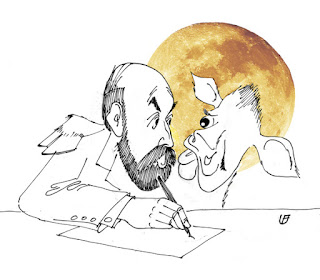Following my post on
parallels I saw between Shylock in Shakespeare's The Merchant of Venice and Rumpelstiltskin, I dug a little deeper into the origins of the Grimm Brothers' tale and discovered that there exists an initial version in manuscript form, which has survived by sheer accident: The Grimms had lent a handwritten collection of tales to their friend Clemens Brentano, who was keenly interested in folk tales, and expected it to be returned. Well, Brentano never did, and the manuscript was found in his bequest—it's known as the
Ölenberger Handschrift (Ölenberg Manuscript). This collection contains, among others, the original version of
Rumpelstiltskin, who is called
Rumpenstünzchen there. The link below will lead you to a translation.
Rumpenstünzchen - My translation
A comparison of this initial version with the
published one is truly startling. It shows, first of all, the lengths to which the brothers went in editing the tales they had collected, which went well beyond embellishments and involved, in the present case at least, a substantial reworking of the plot.
It starts with a reversal in the premise under which the heroine is introduced. In the original, she cannot spin flax properly and always produces gold. In the later version, she cannot spin gold from anything. Subsequent modifications of the plot result from this reversal, as summarized in the table below. (Note that because of the terseness of the original version, the reader has to make assumptions about gaps in the plot, especially when it comes to motivation—it may well be that other readers will interpret the text differently from me, but the table shows my currently best guess.)
| Original manuscript |
Published version |
| The girl always spins gold from flax. |
The girl cannot spin gold from anything. |
| Her predicament is, apparently, that this is not considered a useful talent. |
Her predicament is that the king expects her to spin gold from straw, as promised by her father, and threatens to kill her if she can't deliver. |
| Rumpenstünzchen helps her by marrying her to a prince. We must assume that this solves her predicament because either the prince does appreciate her talent or does not expect his wife to engage in lowly chores. |
Rumpelstiltskin helps her by spinning the straw into gold for her.
The king is impressed and marries her, and the two plots proceed more or less in parallel from here, except for the ending.
|
| Rumpenstünzchen's punishment consists of his not getting the child. Other than that, he escapes unharmed. |
Rumpelstiltzkin not only does not get the child, but also dies a horrible death. |
The Grimms not only rewrote the plot, but embellished it with details, and it's these details that suggested to me the parallels I saw between Rumpelstiltskin and Shylock. In the initial version, we have only the actions of the girl and Rumpenstünzchen, with a guest appearance by the maid—there is no societal context. In the published version, we have interactions between the various protagonists from which a context emerges, a hierarchically-structured society in which everybody has a proper role to play and against which Rumpelstiltskin remains the outsider: As is the case with Shylock, his services are sought to get a member of that society out of serious trouble, but he is denied his mutually agreed-upon compensation, essentially by a conspiracy of the insiders against him
It's fascinating to speculate if the Grimms were, at least subconsciously, influenced in their rewriting of the tale by Shakespeare's play—after all, Shakespeare was extremely popular among the German romantics—among them were A. W. Schlegel and L. Tieck, contemporaries of the Grimms, who completed (with other collaborators) the monumental task of translating all of his plays into German, making him a "German playwright."





















